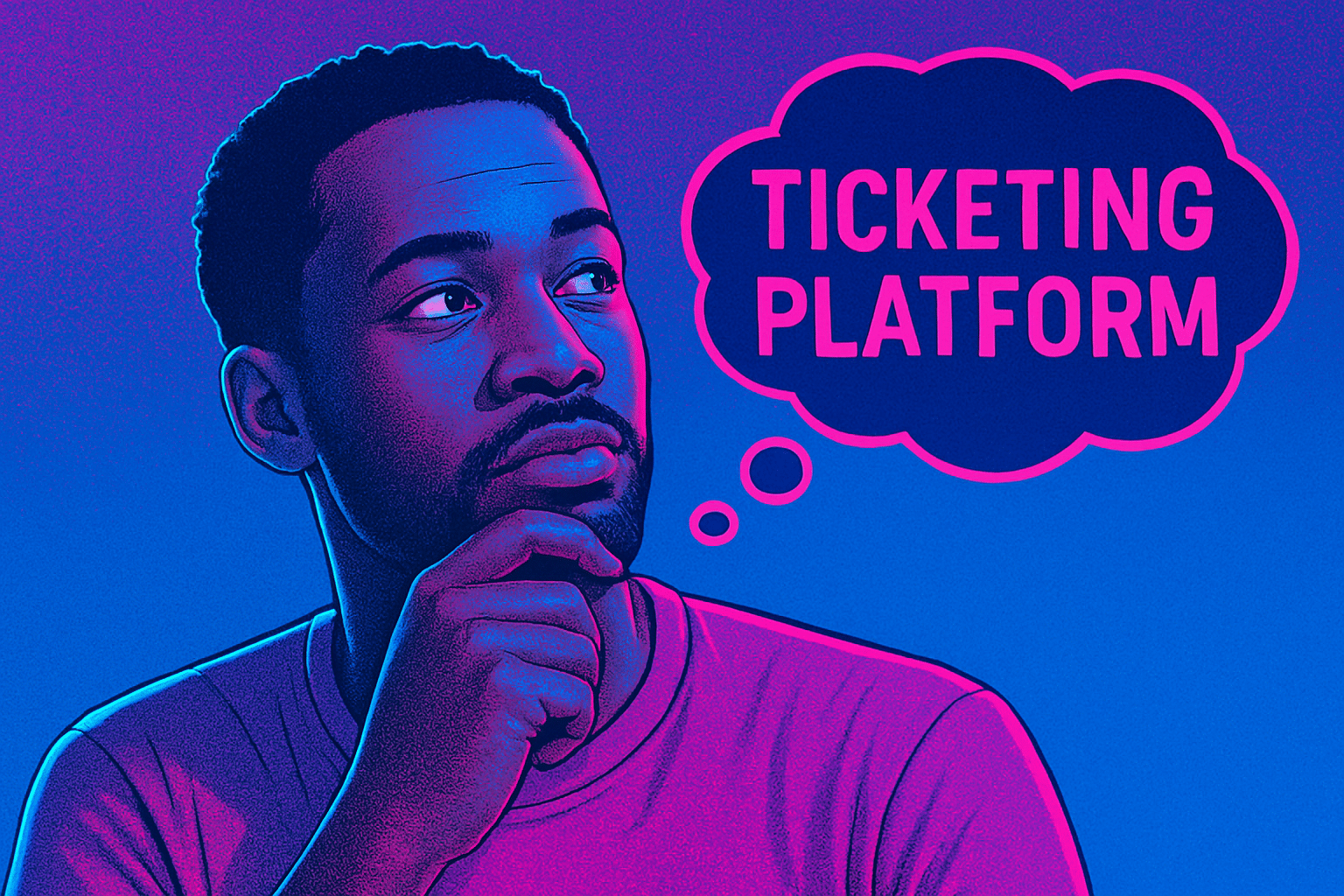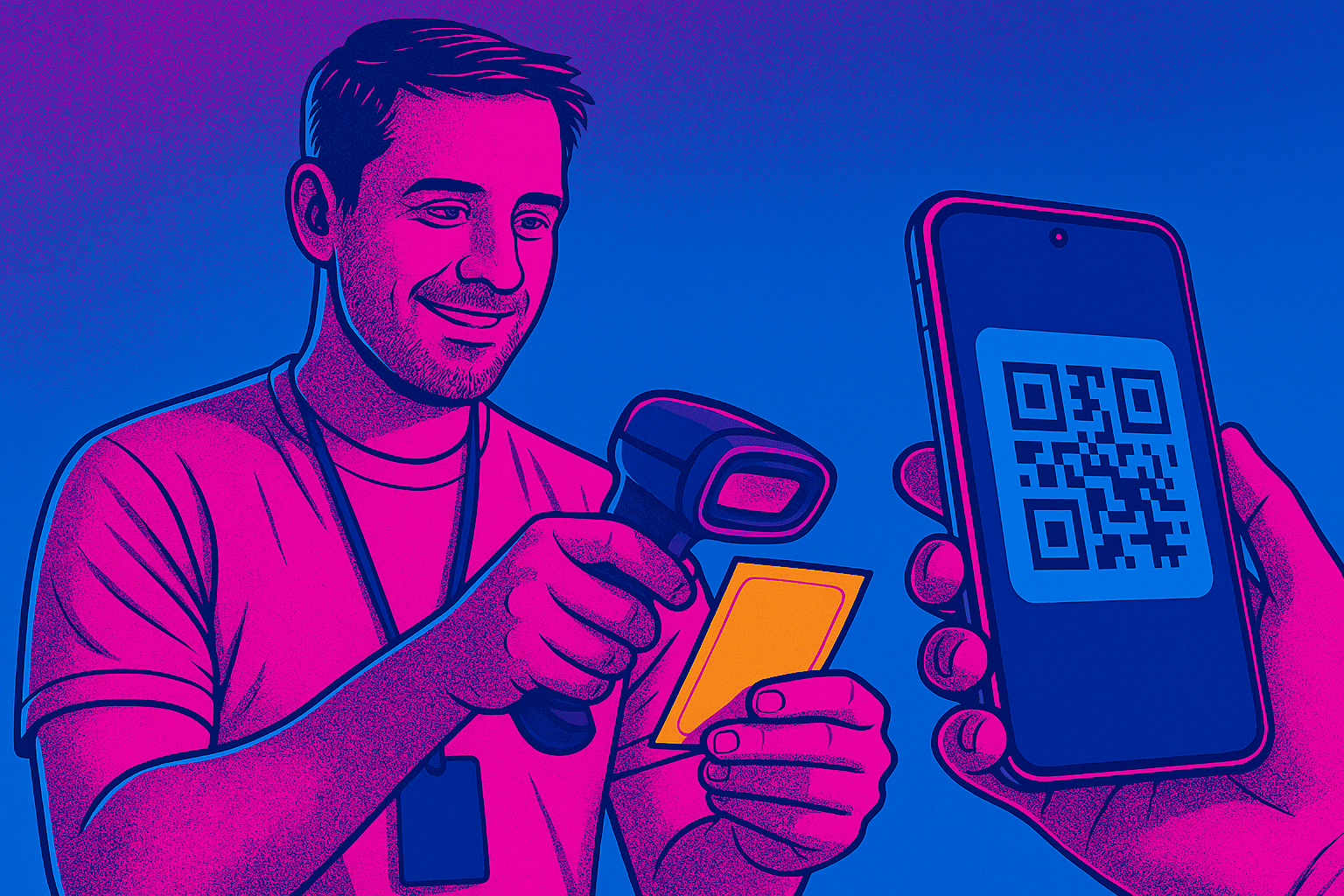
Event organizers and fans alike have long struggled with the pain points of traditional event ticketing – high fees, rampant scalping, and counterfeit tickets.
Maybe you’re an event organizer looking to sell concert tickets for an upcoming music festival, or a fan trying to snag a seat at your favorite artist’s show – either way, the conventional system often feels stacked against you. Even independent artists and small venues find it tough to sell concert tickets profitably under the current system.
Fortunately, a new era of digital tickets is emerging to transform the way we handle event ticketing. Enter the NFT ticket revolution. By leveraging blockchain technology, an NFT ticket turns a simple entry pass into a verifiable digital asset that can revolutionize ticket sales and reshape experiences for both event organizers and ticket holders. In this article, we’ll explore how NFT ticket solutions work, their benefits over traditional methods, and why platforms like Cheers Finance are leading the charge in making ticketing fair, transparent, and innovative.
The Challenges of Traditional Ticketing Platforms
Traditional platforms like Ticketmaster or TickPick have dominated event ticketing for years, but not without significant drawbacks. One major issue is the burden of excessive fees. Fans often pay 30% or more on top of face value in service fees when buying from major ticketing sites. Even “no hidden fee” platforms aren’t truly free – for example, TickPick touts no buyer fees yet still charges sellers a 10-15% commission. These added costs cut into revenue for event organizers and jack up prices for ticket holders, creating a lose-lose situation.

Another challenge is the prevalence of scalping and fraud. In the traditional model, once a ticket is issued, it can be copied, counterfeited, or resold multiple times without the organizer’s control. Ticket holders face the risk of buying fake tickets or getting gouged by scalpers in secondary markets. There’s often no easy way to verify if a physical or PDF ticket is legitimate. This lack of transparency undermines trust in ticket sales and can lead to disappointment at the gate when duped fans are denied entry due to invalid tickets. Meanwhile, professional scalpers reap profits that neither the original event organizers nor the artists see a share of.
Control is another issue. On conventional platforms, event hosts have limited say once tickets go on sale. The platform dictates terms, and organizers cannot easily enforce resale rules or customize how ticket sales are managed. Want to adjust pricing or offer special deals to loyal fans? You might find yourself constrained by a system that wasn’t built for flexibility or true ownership by creators and fans. All these issues can make it a nightmare for organizers to sell concert tickets successfully, frustrating both hosts and attendees.
What Is an NFT Ticket?

An NFT ticket is a digital proof of attendance stored on a blockchain as a unique token. NFT stands for non-fungible token, which means each NFT ticket is one-of-a-kind and cannot be duplicated. In simpler terms, an NFT ticket is a digital ticket that lives on a decentralized network rather than in a centralized database or as a paper printout. Because it’s on blockchain, anyone can verify its authenticity and ownership history instantly.
For event organizers, issuing digital tickets as NFTs means the tickets are minted (created) as cryptographic tokens. These tokens can be transferred or sold peer-to-peer without needing permission from a big ticket company. Imagine being able to sell concert tickets directly to fans as easily as sending cryptocurrency – that’s the power of an NFT ticketing platform. For fans, an NFT ticket arrives in their digital wallet and serves as a badge of genuine entry. It’s impossible for a fraudster to make a fake NFT with the exact same credentials. At the venue, verification can be as simple as scanning a QR code or tapping a device to confirm the NFT’s validity on the blockchain.
It’s worth noting that not all digital tickets are NFTs. You may have used e-tickets or mobile tickets before, which are basically digital copies of a ticket stored in an app or email. Those are convenient, but they’re still centrally controlled and can be duplicated or transferred in unauthorized ways. An NFT ticket takes the concept of digital tickets further by using blockchain’s distributed ledger to ensure ticket holders truly own their ticket and can’t cheat the system. This innovation opens the door to a multitude of benefits that can fundamentally change how we sell concert tickets and manage admissions.
In short, NFT ticketing lets organizers sell concert tickets in a trustless, peer-to-peer way without relying on a centralized vendor.
Benefits of NFT Ticketing for Event Organizers

Adopting an NFT ticketing platform introduces a host of advantages for event creators and promoters looking to sell concert tickets more efficiently. Here are some of the key benefits:
Lower Fees and Higher Revenue: By cutting out middlemen, NFT ticket solutions drastically reduce the fees associated with ticket sales. Instead of losing 10-20% or more to platform fees, organizers keep more of their hard-earned revenue. With platforms like Cheers Finance, there are no listing fees or surprise charges – you can sell concert tickets without giving away a big cut of your profits (Selling Tickets on TickPick vs Cheers Finance). The only obligatory costs are minimal blockchain transaction fees (gas) and a tiny percentage upon final payout, ensuring you retain the lion’s share of your sales.
Complete Control Over Ticketing: With NFT smart contracts, organizers set the rules. You can programmatically control resale conditions – for example, capping resale prices or earning royalty commissions on secondary sales. This means if ticket holders resell their NFT tickets, you as the event organizer could automatically receive a percentage of that sale. An NFT ticketing system, like Cheers Finance, can enable sellers to configure such resale terms directly into the ticket’s code. You regain authority to manage pricing, timing of sales, and how tickets can be transferred, fostering a true free market where you define the parameters to maximize ticket sales rather than a ticketing company.
Instant, Global Marketplace: An NFT ticketing platform operates on the internet and blockchain, so your event tickets are accessible to a global audience of crypto-savvy buyers by default. No longer are you limited by specific resale sites or regional platforms. Anyone anywhere can purchase an NFT ticket with a compatible wallet. This global reach helps you sell concert tickets faster and to a broader community. Plus, because it’s decentralized, there’s no central authority that can censor or limit your event’s ticket distribution. You can truly host an event on your own terms.
Transparency and Trust: Every transaction of an NFT ticket is recorded on a public ledger. This provides unparalleled transparency into ticket sales. You can see how many tickets have sold, at what prices, and to which wallets, all in real time. Such transparency builds trust with your audience, as they know everything is out in the open and verifiable. When you sell concert tickets on a blockchain, both buyers and sellers can verify every detail, removing any doubt. There’s no room for shady practices like selling more tickets than capacity or quietly hiking prices – the blockchain acts as an open audit trail. In fact, data can be logged and verified by anyone, which is a stark contrast to the opaque operations of traditional ticket companies.
Enhanced Security (No Fraud): Because each NFT ticket is unique and verified, the chances of counterfeit tickets or fraud plummet. Organizers can be confident that every ticket scanned at the gate is legitimate, and any attempt to duplicate an NFT would be futile. It’s like having a built-in fraud detection system, backed by cryptography. In other words, you can sell concert tickets online without fearing that scammers will ruin your event. For high-demand events like popular concerts or music festivals, this security is invaluable in protecting both your reputation and your attendees.
New Revenue Streams: NFT tickets can be more than just entry passes – they can unlock additional monetization. For example, you could offer VIP NFTs that grant special access or include bundled merchandise. You might also earn from the collectible value of tickets; highly memorable events could see their NFT tickets traded as digital memorabilia on secondary markets (with you earning royalties on each trade). This creates ongoing engagement and potential income even after the event is over, a concept that simply doesn’t exist with traditional tickets.
A Better Experience for Ticket Holders

It’s not just organizers who win – fans and ticket holders stand to gain tremendously from NFT ticketing as well. NFT-based event ticketing brings direct benefits to the people attending concerts and festivals:
Guaranteed Authentic Tickets: With NFT-based digital tickets, fans no longer need to worry about being turned away at the venue due to a fake ticket. The authenticity of an NFT ticket can be confirmed instantly on the blockchain, providing peace of mind that the tickets they bought are valid and real. No more nasty surprises at the gate – if you have the NFT in your wallet, you’re good to go, period.
Freedom to Resell or Transfer: In the past, selling or transferring a ticket you couldn’t use often came with risks or restrictions. NFT tickets allow ticket holders to legitimately resell their seats or gift them to a friend with ease, peer-to-peer. The blockchain records the change in ownership, and the new owner is guaranteed a valid ticket. There’s no need to go through a convoluted transfer process on a ticket exchange or meet up in person to hand over a paper ticket. Whether you need to sell a concert ticket last-minute or send your festival pass to a friend, it’s as simple as a crypto transfer. This puts power back in the hands of fans while still respecting the rules set by organizers (like resale price limits or royalties).
Perks and Collectible Value: An NFT ticket can double as a collectible or a key to exclusive perks. Because it’s a digital asset, organizers and artists can attach extra content or benefits to it. For instance, Sports Illustrated’s NFT ticketing platform introduced the concept of a “Super Ticket” that offers holders exclusive highlights, collectibles, and loyalty rewards tied to their event ticket. Likewise, an artist could include a link to a free song, a behind-the-scenes video, or a discount on merchandise as part of the NFT’s metadata. After the event, the NFT becomes a souvenir in the fan’s digital collection – a verifiable memento of the concert or festival they attended. Traditional tickets occasionally become wall decorations; NFT tickets become part of a personal digital gallery.
Streamlined Entry & Engagement: Digital tickets in NFT form can streamline the entry process. Instead of fumbling with printouts or app screens, ticket holders could simply scan their NFT QR code or tap their phone, and a blockchain verification ensures it’s the one valid ticket. Some forward-thinking venues or apps might even integrate directly with crypto wallets for one-scan entry. Additionally, owning an NFT ticket might plug fans into a broader event community. For example, having the NFT could grant access to token-gated chats, exclusive afterparty events, or voting on certain event elements (imagine being able to vote on a last song encore because you hold the concert’s NFT ticket!). This level of engagement is unprecedented and turns a ticket into an interactive experience.
Fair Pricing (No Gouging): When you buy an NFT ticket from a platform like Cheers Finance, you aren’t hit with surprise service fees at checkout. The price you see is largely what you pay, aside from perhaps a small transaction fee for the blockchain network. This fan-friendly pricing means you’re not shelling out an extra 30% in fees to middlemen. Moreover, if organizers use smart contracts to prevent outrageous markups on resales, you won’t have to pay scalper prices on the secondary market either. Overall, NFT ticketing helps keep costs fair for ticket holders, aligning with a more free-market approach rather than letting brokers exploit high demand.
Ultimately, when organizers can sell concert tickets through a fair, decentralized system, fans reap the rewards with better prices and experiences.
Cheers Finance: Decentralized, No-Fee Ticketing
One platform at the forefront of the NFT ticket revolution is Cheers Finance. As a decentralized NFT ticketing platform, Cheers Finance is built on free-market principles to empower both event hosts and attendees. The mission of Cheers Finance is simple yet profound: put control back into the hands of event organizers and attendees. It achieves this by eliminating unnecessary intermediaries, enforcing transparency, and drastically minimizing fees.

No More Fee Fatigue: Cheers Finance operates with a radically different fee structure than traditional services. For ticket buyers, there are zero platform fees – you only pay the listed ticket price (and a negligible network gas fee) to obtain your NFT ticket. For sellers (event organizers), Cheers charges no upfront fees to list or sell tickets. Instead, a very small 5% fee is taken only when you withdraw your earnings after the event is over. This performance-based fee model means if you don’t sell tickets, you pay nothing, and if you do, the fee comes out of actual proceeds, not out of your pocket beforehand. Compared to the double-digit percentages taken by sites like TickPick or StubHub, a 5% backend fee is game-changingly low. It’s essentially a no-fee ticketing platform from the perspective of day-to-day use, freeing organizers to sell concert tickets at fair prices and fans to buy without dread of checkout surcharges.
Transparency and Trust by Design: Cheers is built on Ethereum’s blockchain, which means all ticket sales and transfers on the platform are recorded on-chain. Anyone can audit the transactions if they want to verify numbers. More importantly, this transparency extends to user trust – event hosts don’t have to trust Cheers Finance’s accounting, and fans don’t have to trust the organizer’s claims of how many tickets remain. It’s all visible in the smart contract. Additionally, Cheers Finance never takes custody of users’ funds beyond the smart contract itself. Payments are handled in crypto (via USDC stablecoin and ETH for minor gas or transaction costs), and organizers can withdraw their funds whenever they choose post-event, subject to the 5% Cheers Finance fee and negligible gas. This eliminates scenarios where a ticketing company might hold onto your revenue or delay payouts. Unlike traditional platforms that often hide or inflate fees, Cheers offers full transparency: with Cheers Finance, buyers pay no extra fees except minimal gas, and organizers only incur a small 5% upon payout – a stark contrast to TickPick’s 10-15% cut and other hidden charges on legacy platforms.
Permissionless and Censorship-Resistant: As a Web3 platform, Cheers Finance embraces decentralization. Anyone can navigate to the platform and create an event, setting up their own NFT ticket contract without needing approval from a centralized gatekeeper. This means even a small indie venue can sell concert tickets via Cheers without any corporate oversight. This permissionless approach aligns with a free market ethos – you don’t need to be a large promoter or have an exclusive deal with a venue to issue your own tickets. Even independent artists or small organizers can use Cheers to sell concert tickets on their own terms. Furthermore, because transactions are peer-to-peer, the platform itself doesn’t control who buys or sells tickets. There’s no opportunity for blacklisting legitimate buyers or other manipulations that sometimes occur on conventional platforms.
Data Privacy and Ownership: Cheers Finance takes a stance against the invasive data collection often seen with big tech companies. You don’t need to hand over personal data or complete onerous KYC checks to buy a ticket; a crypto wallet is enough to get started. This means your identity stays private – a refreshing change from traditional sites that want names, emails, phone numbers, and more, often for marketing purposes. By not collecting personal data, Cheers ensures your information cannot be misused or sold. Your tickets, transaction history, and even event interactions are yours to keep, secured by your wallet’s keys. In the words of Cheers Finance, “Your data is your own, and so are your events”. This philosophy extends to how the platform itself operates: it’s not leveraging your information for profit, unlike, say, social media giants or ticketing apps that track your every click. That’s not how Cheers Finance earns “customer loyalty”.
Real-Time Control and Flexibility: Using Cheers Finance, event organizers can adjust on the fly. Need to issue more tickets because demand is crazy? You can mint additional NFT tickets if your venue capacity allows. Want to lower the price for a last-minute push or create a discounted batch for early birds? You’re free to do so at any time, because you hold the keys to the smart contract controlling your tickets. Traditional systems often lock you in once sales start, or require going through support channels to make changes. In contrast, a decentralized NFT ticketing platform like Cheers is as flexible as you need it to be. Out of the box, the most in demand features are available to users through our website interface. Through custom configurations or future versions, one could even program dynamic pricing – tickets that automatically get more expensive as the event date nears, or vice versa – all through smart contract logic. The bottom line is that the platform works for you, the event host, not the other way around, enabling you to sell concert tickets quickly and adjust strategy on the fly. This level of empowerment simply didn’t exist in the old ticketing world. (And notably, no personal data or lengthy onboarding is required – just connect your wallet and you’re ready to host an event.)
NFT Ticketing vs. Traditional Ticketing: A Comparison

It’s helpful to see side-by-side how an NFT ticket system like Cheers Finance stacks up against a traditional platform such as TickPick or Ticketmaster. Here’s a quick comparison of key factors:
Fees: As discussed, Cheers Finance has essentially no buyer fees and only a 5% seller fee collected at withdrawal. TickPick, while advertising zero buyer fees, charges sellers around 10-15% on each ticket sold (Selling Tickets on TickPick vs Cheers Finance). Ticketmaster’s fees can be even higher, often split between buyers and sellers, and concertgoers are now likely to pay ~30% of a ticket’s face value in fees on that platform. NFT ticketing clearly wins on cost efficiency for those who need to sell concert tickets affordably.
Ownership: With NFT tickets, you truly own the ticket in your wallet and can transfer it freely (within the rules the organizer sets). Traditional tickets are more like a license – you often need the platform’s permission to transfer or resell, and they can even invalidate tickets if terms are breached. Blockchain gives power back to the ticket owner.
Transparency: Cheers and other NFT systems record transactions publicly, ensuring transparency in availability and pricing. Old-school platforms keep sales data proprietary. You have to trust their reports of a “sold out” show or take their word on how many were sold at what price. In a blockchain model, nothing can be hidden or misrepresented. Every ticket movement is logged on-chain for anyone to inspect.
Fraud Protection: An NFT ticketing platform provides built-in fraud prevention – no fake NFTs can slip through due to cryptographic verification. Traditional platforms try to combat fraud with barcodes and centralized databases, but counterfeit PDFs and scalper tricks still abound. We’ve all heard of or experienced horror stories of people buying what looked like a legit e-ticket only to find it was copied multiple times. NFTs eliminate that risk by design.
Resale Market: In traditional ticketing, the secondary market is often separate (StubHub, Craigslist, etc.) and rife with price gouging. Some primary platforms have started integrating resale features, but they often still take additional fees or impose restrictions. With NFT tickets, the secondary market can be a seamless extension of the primary — since the tickets are just tokens, they can be resold on any NFT marketplace or via a built-in resale hub with rules that the organizer sets. It’s a true free market for reselling, with potential benefits shared among stakeholders (like automatic royalties back to the original event creator on each resale).
Accessibility: Buying from a traditional platform usually requires a credit card, a mailing address, and sometimes accounts on multiple resale sites. In contrast, to buy an NFT ticket, all you need is a crypto wallet. This opens up ticket purchasing to anyone with internet access and some crypto, including the unbanked or those in other countries who want to attend global events. It’s a more inclusive approach to ticket access, and as crypto becomes more user-friendly (with options to load wallets via debit card, etc.), the barriers to entry are lowering.
Real-World Successes and Use Cases
What do NFT ticket solutions look like in action? Let’s examine a few real-world examples and scenarios that highlight how NFT ticket technology is changing the game:

Secure Entry at Live Events: At a basic level, NFT tickets excel at ensuring secure entry. For instance, suppose a popular music festival issues all its tickets as NFTs. Attendees arrive with their crypto wallet app ready. At the gate, staff use a scanner that reads the NFT’s unique ID or QR code and checks it against the blockchain. Entry is granted in a split second, and the NFT is marked as “used” or transferred to a different status to prevent reuse. This is similar to scanning a regular digital ticket, but with the added guarantee that the ticket is 100% authentic and hasn’t been duplicated. The result is shorter lines and no frustrated fans arguing with staff about fake tickets. Events like VeeCon, a conference organized by Gary Vaynerchuk, have already used NFT-based entry successfully – only holders of specific NFT tokens could attend, essentially turning collectibles into access passes.
Preventing Ticket Fraud and Scalping: The immutable record of transactions on blockchain means you can always trace a ticket back to its source. If someone tries to sell you an NFT that didn’t originate from the official event contract, you’d know it instantly by checking the token’s origin. This traceability, combined with smart contract enforced rules (like capping resale prices), can virtually eliminate scalping and fraud from the ecosystem. We’re seeing this in action in sports and entertainment. The NBA has experimented with issuing NFT-based tickets for greater traceability, and Sports Illustrated’s NFT ticket platform was explicitly designed to combat scalpers while giving control to hosts and performers. When every ticket is trackable and resales can be regulated, the integrity of the ticket market skyrockets.
New Engagement Opportunities: NFT tickets also unlock novel ways to engage with your audience. Consider the example of VeeCon again: Gary Vaynerchuk not only sold NFTs that acted as tickets, but those NFTs doubled as community tokens that conferred other benefits over time. Similarly, a band could issue NFT tickets that grant holders special digital content, like an unreleased track or access to an online fan club. We already see experimentation here: some events have created NFT ticket stubs that update with highlights from the show afterward, turning your ticket into a living memory of the event. Sports teams have offered NFT tickets that come with digital collectibles of the game’s best moments. These fun extras increase fan satisfaction and can even become valuable themselves on secondary markets (imagine owning the NFT ticket of a legendary concert – it could become a collectible trading at high prices, like old concert posters, but with provable authenticity).
Token-Gated Experiences: “Token gating” is a buzzword meaning you use an NFT as the key to unlock something exclusive. NFT tickets can enable token-gated experiences both at the event and online. For example, at a festival, holding a VIP NFT ticket might automatically get you into the backstage lounge or afterparty because the bouncer can verify your wallet for the VIP NFT. Online, the event organizer might host an exclusive livestream or Q&A for NFT ticket owners before the show. This gives ticket holders more bang for their buck and encourages early ticket purchases (since those perks can start even before the event happens). It’s a way of extending the lifecycle of a ticket to before and after the event, keeping fans engaged continuously.
Case Study – Sports Illustrated’s Box Office: One of the most prominent endorsements of NFT ticketing in the real world comes from Sports Illustrated. In mid-2023, Sports Illustrated Tickets launched “Box Office,” a self-service blockchain event ticketing platform powered by Polygon. They introduced the Super Ticket™, which, as mentioned, allows event organizers to remain connected to ticket buyers through perks and content. Notably, Sports Illustrated’s solution boasts up to 50% lower pricing than traditional systems and even lets performers earn a share of resale revenues – a concept very much aligned with what blockchain ticketing enables. They also charge zero transaction fees for the consumer, highlighting that even big industry players recognize that the future is fee-free and user-centric. This move by a household name validated the NFT ticket approach and showed that it can scale to major events across sports, concerts, and more.
Case Study – VeeCon (Gary Vaynerchuk): VeeCon provides a compelling use case of token gating and community building. By making the conference accessible only to holders of his VeeFriends NFTs, Gary Vee ensured that attendees were literally invested in his community. All holders of the 10,000+ VeeFriends tokens were granted access to attend VeeCon for three years. In practice, thousands of people attended VeeCon using their NFT tickets, and there was a thriving resale market for those NFTs between annual events. The success of VeeCon demonstrated that even non-technical audiences could navigate using NFT tickets when the value was clear. It’s a model that could be replicated for fan clubs, annual festivals, or any event series where loyalty and early commitment are rewarded.
Conclusion: Embrace the Future of Ticket Sales

The way we sell concert tickets and attend live events is undergoing a seismic shift. NFT ticket solutions are at the heart of this transformation, bringing the ethos of decentralization and the efficiency of digital assets to the world of concerts, sports, and festivals. By adopting NFT ticketing platforms like Cheers Finance, event organizers can unlock a transparent, no-fee, and highly flexible approach to ticketing. In turn, ticket holders enjoy authentic digital tickets they can trust, along with newfound freedom and perks that enrich their event experience.
Cheers Finance exemplifies how a free-market, blockchain-powered mindset can disrupt an industry long dominated by middlemen and murky practices. It provides a vision of event ticketing where creators and fans interact directly, value flows to those who deserve it, and every ticket is more than just a slip of paper – it’s a gateway to experience, community, and even a piece of memorabilia minted on the blockchain. The benefits of this new paradigm, from eliminating fraud to boosting engagement, are simply too significant to ignore.
As the examples of Sports Illustrated and VeeCon show, NFT tickets are not just theoretical – they’re being deployed by forward-thinking organizers to great success. Major brands and independent promoters alike are proving that blockchain can handle large-scale ticket sales, while delivering advantages unmatched by the status quo. In the coming years, we can expect many more concerts and festivals to embrace NFT ticketing, fulfilling the promise of a fairer and more innovative event ticketing industry.
The bottom line is this: if you’re an event organizer looking to maximize your reach and revenue, it’s time to explore how to sell concert tickets through NFT technology. And if you’re an avid concert-goer or sports fan, don’t be surprised when your next ticket stub is an NFT in your crypto wallet – it might just be the key to a richer, more secure, and more memorable live event experience.
Revolutionize your events with NFT ticket solutions, and be part of the next evolution in event ticketing – one where you can sell concert tickets more fairly and efficiently, and fans enjoy a richer, more secure experience.
Cheers!
